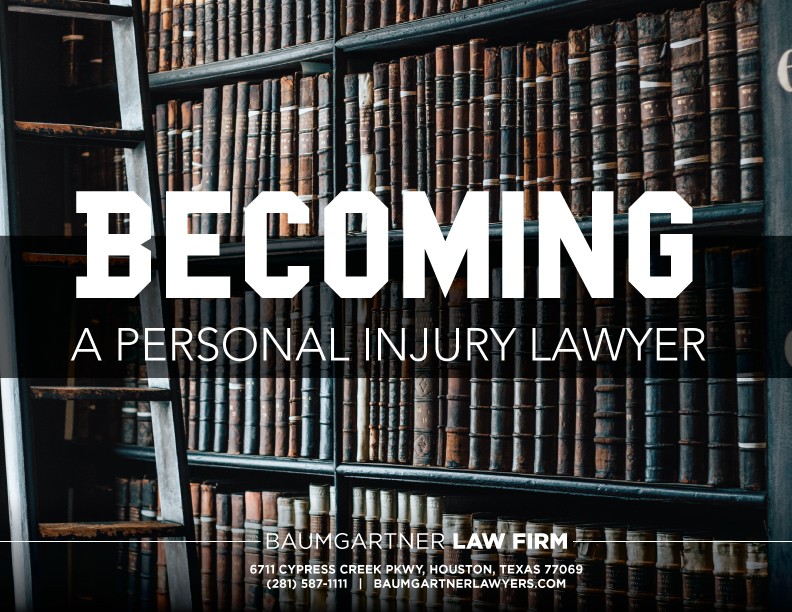Many young people aspire to be attorneys and are considering their practice options. One such option is becoming a personal injury attorney.
This article is written to give aspiring attorneys a practical perspective on personal injury law.
To become a personal injury lawyer, you must graduate from law school and obtain a law degree. Also, you will need to take the bar exam for your state.
Getting a Bachelor’s Degree
Law schools generally accept any undergraduate degree from an accredited university and do not necessarily give preference to any one specific undergraduate study area or degree.
Some of the more common undergraduate degrees for law school are in political science, English, and communications, and some colleges offer pre-law degrees.
If your university offers a pre-law degree, that would be preferable for undergraduates.
Subjects such as writing, English, and speech are all very helpful in providing a basic foundation for your legal studies and also in preparing you for the law school entrance test, the LSAT.
Getting a Law Degree
Law school is a three-year program after your bachelor’s degree. Like college, the first year typically consists of core legal subjects, including torts, property law, criminal law, and constitutional law. For those seriously considering a career in personal injury law, the core torts course provides a comprehensive overview of the legal basis for personal injury claims.
After the first year of law school, students are given choices of which classes they can take. If you are interested in personal injury, subjects like trial skills and negotiation are a good choice.
Students should endeavor to enroll in law schools accredited by the American Bar Association.
While in law school, participation in trial coursework is advisable. Personal injury attorneys need to be skilled trial lawyers. The more practice you have in moot court and trial practice in law school, the better you will be for real-world practice.
Clerking for law firms while attending law school is highly beneficial for law students. This enables students to experience the legal profession beyond the classroom.
For students unsure of which area of law they want to practice, it may be a good idea to clerk at various law firms and practice areas, gaining experience in multiple areas.
Taking the Bar Exam
Individual states require lawyers to pass the bar exam after graduating from law school to practice within that state. The exam covers state-specific issues and general legal areas and is a multi-state multiple-choice test. Taking a bar exam preparation course is also recommended.
Practicing as a Personal Injury Attorney
After graduating from law school and passing the bar examination, it is always advisable to obtain hands-on practice with a reputable law firm.
Many personal injury attorneys are former defense attorneys who gained experience by trying cases for insurance companies. Insurance defense attorneys and DAs, particularly those starting in law practice, can obtain trial experience relatively quickly.
Look at the training offered by law firms you’re considering for your initial employment.
Training is probably the most important component of securing a successful future as a personal injury attorney and should be a primary consideration for your first job.
Some firms offer very detailed training, while others emphasize on-the-job training. Always inquire about initial training and opportunities for further learning.
Always Learn
A personal injury attorney must also strive to improve in every category on a daily basis. Representing catastrophically injured individuals whose lives have often been shattered requires compassion, understanding, active listening, and effective people skills.
Additionally, personal injury attorneys must learn to be selective in accepting cases because most of their work is based on a contingency fee arrangement. In other words, they are not paid for their time and effort if they do not win the case.
Be wary of the potential client who claims it is a “matter of principle,” as this is a red flag for a potential lack of damages. A personal injury lawyer must also be a businessperson when taking cases on a contingency fee basis.
Changing Legal Environment
Trial lawyers, particularly those specializing in personal injury, have been targeted in numerous states recently. Calls for “tort reform” are a mechanism to change personal injury practices in individual states, such as Texas, and at the federal level.
Some organizations funded by insurance interests seek to limit damages to victims and access to the courthouse. Do not underestimate the impact of pro-insurance politics in your state. Unlike hourly-paid attorneys, most personal injury law firms must fund case expenses and only get paid if money changes hands.
Tort reform reduces access to attorneys in areas where they can not be paid fairly for the risk and time they take on. As a result, attorneys are often unable to assist in many circumstances.
In some states, the practice of personal injury law is more financially attractive than in others. The latest trend has been to limit the rights of innocent victims by capping damages and reducing attorneys’ fees.
By making personal injury litigation less financially attractive, lawyers shift to other areas of practice, and, in some states, victims often find they cannot find an attorney to assist them in certain practice areas.
In Texas, tort reform includes capping damages in medical malpractice cases and imposing expensive legal hurdles. The net effect has been that victims of medical malpractice in Texas often struggle to find representation for their cases.
Aspiring attorneys interested in personal injury law should research the legal environment within the state where they plan to practice to analyze the feasibility of a career in this field.
Rewards of a Personal Injury Practice
Being a personal injury lawyer can be very rewarding. The personal relationships you form with those who are seriously injured can last for decades.
You can have a profound impact on someone in a time of great need and vulnerability. Representing the catastrophically injured can also involve significant pressure, as you are often their only hope. Overall, I highly recommend a career in personal injury law.
Contact the Houston personal injury attorneys at Baumgartner Law Firm at (281) 587-1111.
Baumgartner Law Firm
6711 Cypress Creek Pkwy
Houston, TX, 77069













